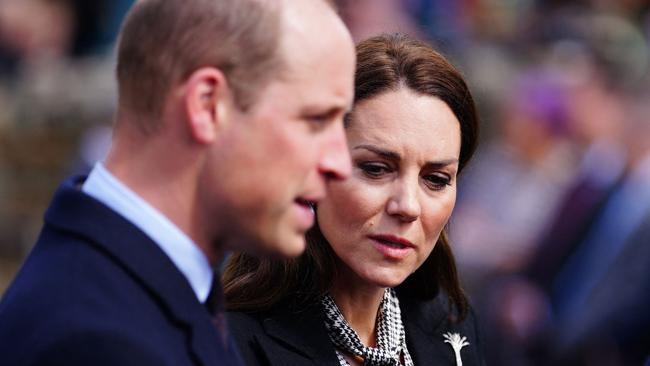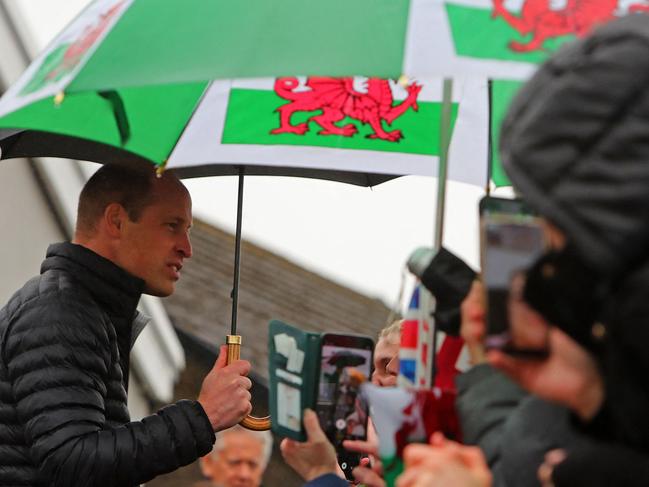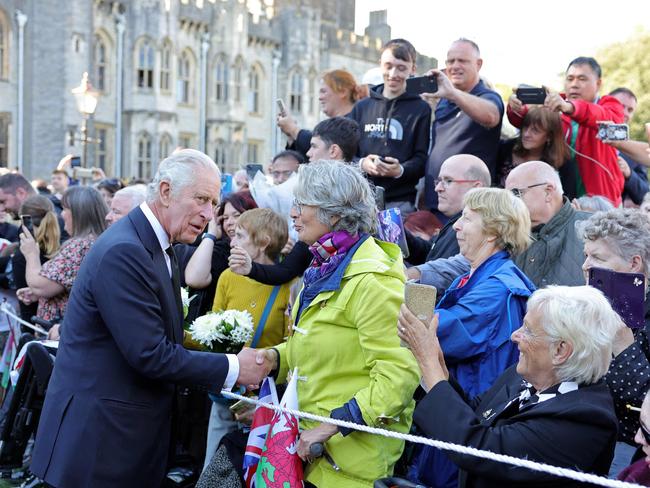Why Prince William and Kate Middleton’s new titles are a sore point for UK country
They might be two of the most popular royals but a bordering UK country has a major issue with Prince William and Kate Middleton.

Royals
Don't miss out on the headlines from Royals. Followed categories will be added to My News.
Prince William’s “Wales” title is one of the most noble and recognisable within the British royal family, but his recent promotion has exposed a little-known problem over its origins.
King Charles’ coronation this Saturday will officially cement William’s status as the Prince of Wales, and while the historic event is a cause for celebration across the Commonwealth, there is one prominent country within the United Kingdom where many will not take part.
The monarchy, and the use of the Wales title in particular, represents a long-suffering pain for its bordering nation of Wales, particularly in the more rural north of the country of 3 million.
The country is an integral part of the UK but largely looks after its own affairs while the Welsh language – quite different to English – is widely understood.
Wales, the capital of which Cardiff is just two hours away from London, is renowned for its rugged coastlines, thick accents, male voice choirs, friendly folk and a love of football.
Anyone who follows soccer will have, at some point, felt the thunder of the Welsh fandom. I use sport as a reference here because that’s where we see Wales’ patriotism en masse, but such devotion runs so much deeper than entertainment.
It’s arguably the only country that’s profound nationalism is felt among foreigners, (Welsh actor Michael Sheen going viral around the world for his rallying World Cup speech was just one example of this).
But, at least for those consumed in mainstream media, Wales is probably most commonly associated with the royals.
The now King Charles took the title of Prince of Wales in 1958 before passing it down to his eldest son, Prince William, after the Queen’s death in September. Prior to that, it’s been a title for almost all heirs in the British royal family since the 13th century.
Kate Middleton took on the role of Princess of Wales alongside her husband, becoming the first woman to officially hold that title since the late Diana.
In the days after his mother died, Charles and Queen Consort Camilla paid a visit to Cardiff, where they were hit with a painfully frosty reception.
BREAKING: King Charles met by BOOS and JEERS as he arrives at Cardiff Castle in Wales with Camilla. It was his first tour as monarch. #Wales#QueenElizabeth#kingcharles#QueenElizabethII#Cardiffpic.twitter.com/ob0uXvMyg5
— Urban Pictures (@Urban_Pictures) September 16, 2022
There were, of course, usual scenes of adoring fans lining barricades for the walkabout, but there was also chorus of boos aimed at their majesties, while people were filmed heckling Charles about the cost of living crisis engulfing the city.
It sparked questions as to why a nation so closely linked to the royal family – at least by name – would carry hostility toward Charles.
Again with the whole sport theme, there’s a centuries-old reason behind why England has become Wales’ biggest rival on the pitch.
It’s a deeply personal bad blood that’s spilt from generation-to-generation, going back to at least the 14th century when Welsh figure Owain Glyndwr led a gallant rebellion against King Henry IV to free his nation from English rule.
During the 15-year rebellion, he gave himself the title “Prince of Wales”, making him the first native prince of the region.
Glyndwr was eventually defeated by England, but even after all this time, lives on as a symbol of Welsh pride.
In central Cardiff, across the road from the capital’s medieval castle where Glyndwr lived, there’s a pub named in honour of him, which was officially rebranded into the Owain Glyndwr pub a decade ago.
The venue’s team leader, Lizzie, 23, is from London, but moved to Cardiff in the last six years because she greatly respects the Welsh spirit.
“As a symbol, [Glyndwr] seems to be stronger now more than ever before,” she tells news.com.au. “People are pushing for Welsh independence, particularly up in the north of Wales, and I think they’ve taken him as the figure to drive that ideology.”

Lizzie says while Welsh people adored the late Queen, they’ve held onto resentment toward the monarchy. Now that she’s gone, it feels as though the fight for independence is gaining momentum again.
“I think what’s annoying is that, [William and Kate] have been given this title Prince and Princess of Wales, which is something that surely should rightfully belong to a Welsh person,” she said.
“When the Queen passed, I think people in Wales were genuinely upset. We all knew she was brilliant. I think it’s all been more political, and how the Welsh felt pushed out and taken control of through that.”
Aside from the contentious history, Wales is also in the grips of a cost of living crisis, with January data released by the health service NHS Wales revealing 37 per cent of locals felt they were “only just managing”, and a further 11 per cent were “not managing” to make ends meet.
“There are people living on the streets, there are people suffering, people that can’t pay their electric bills and their gas bills, hospital fees they can’t afford, and yet this coronation is costing 250 million,” Lizzie said.
“I thought the point of a monarchy is a duty of care to your people and your country. And that’s not being shown.”
Irish-born, Cardiff-based Anthony, 88, said locals despised forking out to fund the royal family’s lifestyle – which cost the taxpayer around $190 million a year between 2021-2022.
“They cost too much money,” he said. “All the property they’ve got, they’ve inherited over the years. Years ago. So they’re very wealthy. But they seem to keep their money.”

His friend, Gerry, 87, agreed, saying he ignores the fanfare and would much prefer to “watch the local racing” while the historic moment unfolds at Westminster Abbey on Saturday.
“None of us care that much about it. They’re not in our conversations,” he said.
Cardiff born Alyson, 56, and Kylie, 34, said people nearby were having to choose between eating or having their heater on, making the ultra-expensive coronation spectacle all the more difficult to get around.
“They all, and the government, get their nice wages. None of them is struggling to get electric or dinner on the table,” Alyson said.
“It’s not nice. Especially when, even down to government, you’ve got them on your TV saying ‘You know, we all just have to be a bit poorer now’ [amid the cost of living crisis],’” Kylie added. “And it’s like, ‘But you’ve never had to worry about if you’re going to eat?’”
Alyson said she believed Wales will likely never break away from the UK and become a separate nation. But she thinks, ultimately, it shouldn’t matter, because the country has formed its own identity anyway.
“Our pride is immense. Immense. Every bit of it,” she said. “We ain’t English. OK?
“We will always say, ‘I’m born and bred Wales’, I don’t know what it is, we’re just all pulled together.”
-Lexie Cartwright in Cardiff, Wales
Originally published as Why Prince William and Kate Middleton’s new titles are a sore point for UK country





